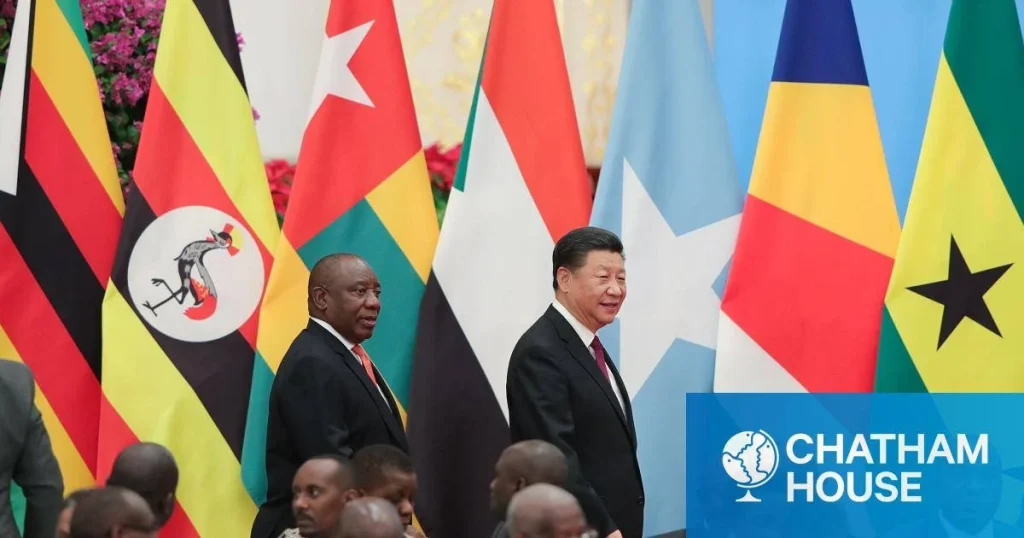Context:
Recently, the Chinese Minister of Foreign Affairs visited four African countries, Egypt, Tunisia, Togo and the Ivory Coast.
Background
- Since the 1950s, China and African nations have forged a strong bond.
- During the Cold War, China backed African liberation movements.
- In the 70s, Africa’s support proved crucial in securing China’s seat on the UN Security Council.
- Initially, their ties were built on ideology, but in 1999, China’s “Go Out Policy” pushed companies to invest in Africa.
- In 2000, the Forum on China-Africa Cooperation (FOCAC) established a framework for collaboration through diplomacy, trade, and investment.
- Under Xi Jinping, this has evolved from simple trade and aid to “mutual security assistance.”
- The 2013 Belt and Road Initiative deepened the relationship further, with 52 African countries signing on.
Present Status
- China dominates Africa’s trade scene, importing a whopping quarter of the continent’s raw materials.
- Their financial footprint is just as substantial, with over $170 billion loaned to 49 African countries from 2000 to 2022.
- Beyond investments, China is increasingly acting as a strategic player. Not just an economic presence, the People’s Liberation Army Navy established its first international base in Djibouti, marking a significant shift in their involvement.
China’s objectives in Africa
Resource Security: Africa supplies 90% of the world’s cobalt and platinum, and 75% of coltan, essential for electronics.
- China has the largest refineries in Africa for rare earths and minerals that are vital to its emerging tech industry.
- The dominance in the mining sector has made the U.S. dependable on China for key minerals from Africa.
Geopolitical Alliance: In the UN General Assembly, Africa is the largest bloc and has the power to swing resolutions on contentious issues like the South China Sea.
- Africa has been vocal in supporting China in the international arena including its “One China” policy for Taiwan and Hong Kong.
The Yuan (RMB) Promotion. China is encouraging Africa to trade in Chinese currency.
- The RMB offers cross-border yuan-based “panda bonds,” by which foreign governments can issue funds from China at lower interest rates.
- Additionally, China’s debt restructuring of Zambia’s $4.1 billion loan has incentivized borrowers towards RMB.
- With lower Chinese interest rates and the depreciation of African local currency, the RMB stands as an alternative to the dollar.
Market Expansion:
- Africa imports largely from China for finished goods. The African markets for Chinese exports are beneficial for the Chinese economy.
- Africa’s young population and cheap labour force support Chinese exports globally and in Africa.

What does this mean for Africa?
- Africa and China engage in a dynamic exchange: African resources fuel China’s growth, while China reciprocates with investments, trade, and development aid.
- Beyond raw materials, China is a substantial source of foreign direct investment in Africa, contributing to infrastructure development and industrial parks.
- These Chinese-built ventures create jobs, propel African manufacturing (“Made in Africa”), and advance agricultural progress through hybrid crop collaborations.
- This “win-win” partnership enjoys high trust in Africa, particularly its focus on non-interference in internal affairs.
- Unlike Western aid which can come with political strings attached, China’s lack of conditionality empowers African countries to pursue their own developmental goals.
Concerns from China’s Investment
Debt Concerns: Western anxieties about China’s investments in Africa focus on the potential for “debt traps.”
- While mismanagement by some African governments like Kenya and Zambia has led to trouble, manageable debt arrangements also exist. The “debt trap” narrative, however, cannot be simply dismissed.
Non-interference Dilemma: China’s hands-off approach, lauded by many in Africa, comes with a flip side.
- This policy of non-interference can provide cover for authoritarian regimes, perpetuating their rule without criticism or pressure for reform.
Conclusion:
China’s increasing presence in Africa is undoubtedly shaping the continent’s future. Understanding the complex motives and impacts of this relationship is crucial for both Africa and the wider international community.

